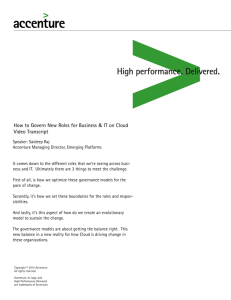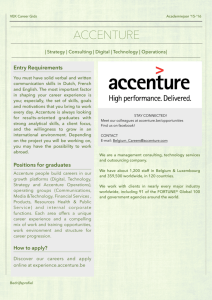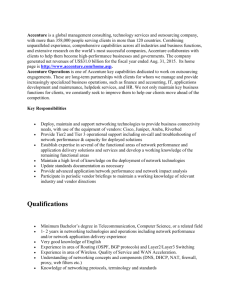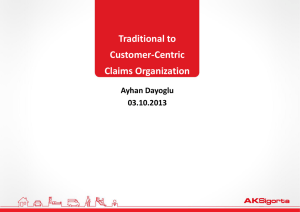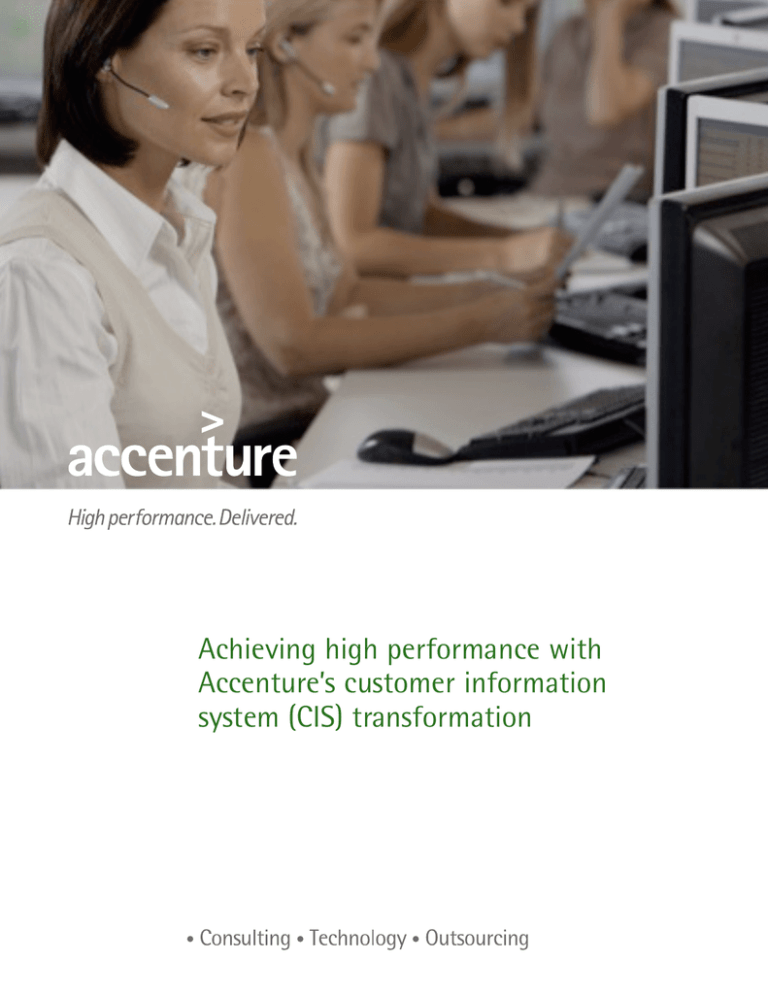
Achieving high performance with
Accenture’s customer information
system (CIS) transformation
Transforming your customer information
system brings risks—and rewards
For every utility, the customer
information system (CIS) is the
critical backbone of customer care
operations. From customer care
and metering to billing, payments
and credit and collections, these
applications enables the customer
experience and support all aspects
of billing and revenue collection.
Yet, in most utilities, legacy systems
simply are not equipped for today’s
challenges and opportunities.
After recognizing the necessity of
making changes to the CIS, your
utility faces a host of questions and
considerations. Among them: Should
the CIS be upgraded or replaced?
Which software package best fits your
business needs? What risks should
you be aware of when deploying a
new CIS solution? And finally, does
it make sense to enlist the help of
an integrator or manage this large
initiative in-house?
As utilities continue to face the
strong likelihood of upward cost
pressures—as well as regulatory
requirements around rate structure
and smart metering—transforming the
CIS is fast becoming a strategic and
operational imperative.
CIS transformation is a herculean
effort. It typically involves a financial
investment of $50 million to $100
million or more, it can take years to
complete and it introduces a host
of potential pitfalls. Done poorly,
a CIS transformation initiative can
wreak havoc, leading to incorrect
2
account information, incorrect
billing, unexpected down time and
unexpected system performance
issues.
Yet, high-performance businesses,
including utilities, recognize that
CIS transformation can also bring
significant rewards (see Figure 1).
To help mitigate risk and maximize
results, high performers engage
the expertise of an integrator. They
recognize the advantages of working
with the right integrator versus going
it alone. Specifically, they know
that an integrator can help reduce
the risks around poorly defined
scope, a lack of business and/or
operational readiness, an IT support
organization that needs new skills,
and poorly executed deployment.
Did you know?
CIS can account for more than
25 percent of a utility's total
application and operations
maintenance budget.1
A typical CIS business case is
based on several key levers that
can reduce cost by up to 35
percent through process and
operational efficiencies enabled
by technological improvements.2
Initial costs are higher when
replacing a CIS with a packaged
solution compared to upgrading
a legacy system. However,
in the long run, utilities that
invest in a new CIS package can
realize significant savings in
maintenance costs.3
Figure 1. CIS transformation.
A typical CIS business case is based on several key levers that can reduce cost by up to 35 percent through process and
operational efficiencies enabled by technological improvements.*
Baseline
cost to Meter
reading
serve
processes
Billing and
payments
processes
Credit and
collections
processes
Flexibility
enhancements Reporting
improvements
Process
optimizations
Potential
savings,
up to 35
percent
User interface
enhancements Infrastructure
integration
Operational
customizations
Application
management
Optimized
cost to
serve
Technology
integration
Additional savings possible by integrating additional
meter-to-cash systems and knowledge management tools
* Accenture case study: Cost-to-serve optimization
3
Accenture’s approach to CIS transformation
In delivering CIS transformation
solutions, Accenture relies upon a
proven four-phase approach: analysis,
technical integration, support and
outsourcing or staff augmentation
(see Figure 2). Depending on your
utility’s needs, you can engage
Accenture for one or all of
these phases.
In the analysis phase, we develop an
understanding of your business needs
and how your current CIS elements
and functionality are meeting, or
falling short of, those needs. We help
determine your requirements for your
new or enhanced CIS, and then we
recommend one or more options for
bridging the gap between where you
are and where you need to be.
In the technical integration phase,
we analyze your existing business
processes and help you in selecting
a CIS software vendor based on your
technical and functional needs. Just
as important, we design and build
the required customizations to the
vendor solution, along with migration
processes to transfer legacy data
to the new system. We also oversee
testing, user training and the actual
deployment of the new system.
Accenture’s support continues
beyond your “go-live” date. We
monitor and assess system and
operational performance, identifying
opportunities for further adjustments.
We also provide additional user
training and support, as needed.
4
In the fourth phase—outsourcing or
staff augmentation—Accenture helps
in identifying roles and responsibilities
that our employees can fulfill. By
transitioning application and/or
operational support processes to
Accenture, your utility can improve
customer satisfaction and reduce
operating costs through increased
efficiency. What’s more, this approach
helps you better prepare for new
retail capabilities as they emerge.
•Strong vendor alliances. Accenture
extends our technology and business
capabilities through a powerful
alliance network of more than 150
market leaders and innovators,
to provide our clients the best
specialized skills and tailored
solutions. Accenture has strategic
alliance relationships with SAP and
Oracle, among others.
In assisting utilities with their CIS
transformations, Accenture draws
upon significant strengths. Those
strengths include our:
•Asset-driven approach. Accenture
has more than 2,000 leadingpractice deliverables, source code
and tools that we have refined
through CIS transformation projects
around the world. Reusing these
assets improves solution quality and
reduces costs.
•Proven delivery experience.
Accenture has a global network
of CIS professionals who have
accumulated years of experience
delivering similar systems in the
utilities industry. Engaging reputable
experts to design and deliver
can reduce costs and impacts to
operations upon deployment.
Ultimately, Accenture
empowers your utility
to make a high-value,
low-risk transformation
to technology solutions
that will deliver process
improvements—and
operational efficiencies—
throughout your
organization.
Figure 2. CIS transformation delivery approach.
Analysis, roadmap
and blueprint
Technical
integration
Post go-live
support and
enhancements
Outsourcing
or staff
augmentation
5
Large electric utility reduces cost to serve
At large utility engaged Accenture
to replace its legacy customer
information system with a customercentric SAP CR&B (formerly known
as IS-U) solution. The solution was
developed with flexibility in mind—to
provide multiservice, multicompany,
multilocation capabilities—and
designed to serve as a platform for
additional clients. It was deployed
in 2003 with minimal deploymentrelated impact to the business.
Following the implementation, the
utility reduced cost to serve by 35
percent and increased customer
satisfaction by 18 percent. Accenture
maintains and operates the system
as part of a 10-year outsourcing
arrangement signed in 2003.
We know what it takes
to execute successful
CIS transformations.
Utilities industry experience
What can you expect when you
team with Accenture?
You work with professionals who
understand the unique challenges of
the utilities industry. We see the world
as you do and can help your company
differentiate itself to achieve high
performance. Our understanding of
key business issues and trends, and
applicable technologies and business
solutions enables us to deliver
innovative yet practical solutions
tailored to each client. We bring a
breadth of skills, capabilities and
assets to help utilities address our
clients’ business challenges, including:
6
Accenture’s utilities industry group
has more than 30 years experience
working with electric, gas and
water utilities worldwide. Our group
includes 7,500 utility industry people
working with approximately 275
clients in 40 countries. We serve 74
percent of the utilities on the 2009
Global Fortune 500 list using our
deep, global industry knowledge,
people and assets to help clients
develop the strategies and adopt
solutions to improve performance in
the dynamic utility market.
Client-ready utilities assets
Accenture has developed many
utilities assets, including the High
Performance Utility Model, based
upon our extensive consulting,
systems integration and outsourcing
experience. This model helps utilities
assess their performance against
industry leaders, jump-start business
improvement projects and accelerate
program delivery.
Accenture Utilities BPO Services
Accenture not only has leading
consulting capabilities, but we
also have a deep operational
understanding based on our business
process outsourcing (BPO) services
for utilities. Accenture Utilities
BPO Services provides solutions
to 14 clients and 15 million
customers in North America,
Europe and Asia Pacific.
Contact us
Accenture’s approach to CIS
transformation is holistic and
designed to help retail utilities
navigate through today’s challenging
environment. We work with
companies to chart a successful
course to improve their core
technology systems—and to build
the high-performance businesses
that can compete and win in a
changing environment. We would like
to hear about your needs and discuss
how we can work together to help
your organization advance toward
high performance.
Gregory S. Guthridge
+1 604 646 5043
gregory.s.guthridge@accenture.com
Martin de Weerdt
+31 20 4938207
martin.c.de.weerdt@accenture.com
Anita Hui
+1 604 646 5081
anita.hui@accenture.com
Pat Keyes
+1 414 212 1546
j.patrick.keyes@accenture.com
Endnotes
1. Technology vendor analysis matrix
for CIS and meter-to-cash BPO,
UtiliPoint, 2007.
2. Accenture case study: Cost-to-serve
optimization.
3. Accenture CIS assessments drawn
from analysis of four options: CIS
program cost, overall meter-tocash transformation program cost,
customer care operations cost and
intangible cost/value.
Alla Krapivsky
+61 3 98387427
alla.krapivsky@accenture.com
7
About Accenture
Accenture is a global management
consulting, technology services
and outsourcing company.
Combining unparalleled experience,
comprehensive capabilities across all
industries and business functions,
and extensive research on the world’s
most successful companies, Accenture
collaborates with clients to help them
become high-performance businesses
and governments. With more than
176,000 people serving clients in
more than 120 countries, the company
generated net revenues of US$21.58
billion for the fiscal year ended
Aug. 31, 2009. Its home page is
www.accenture.com.
Copyright © 2010 Accenture
All rights reserved.
Accenture, its logo, and
High Performance Delivered
are trademarks of Accenture.


